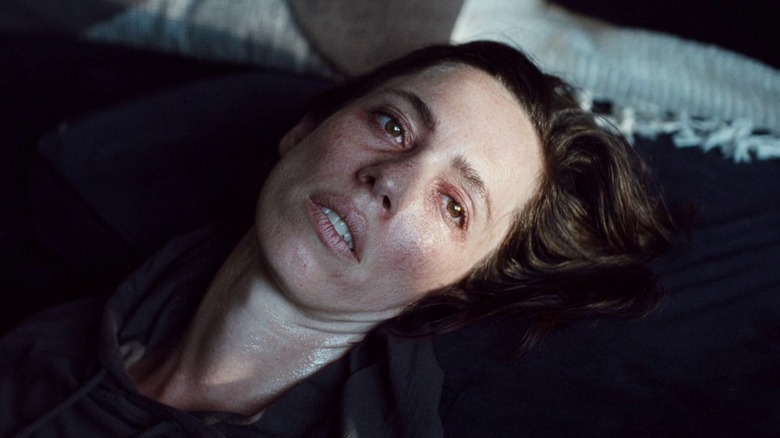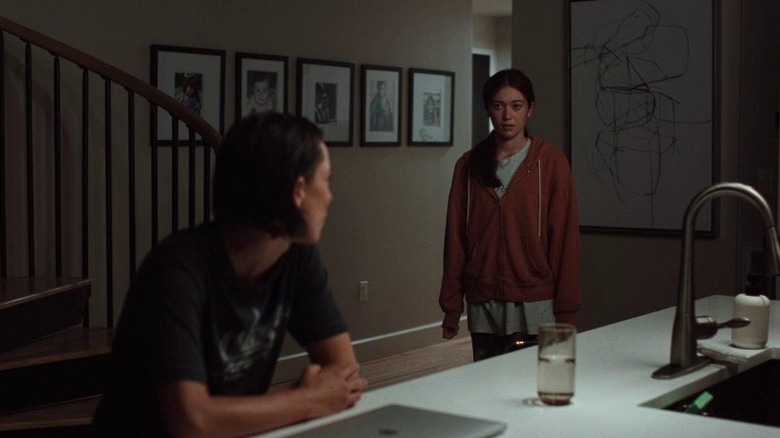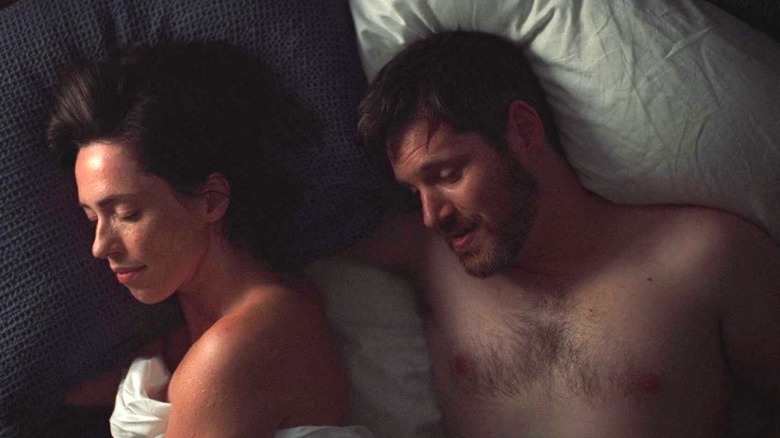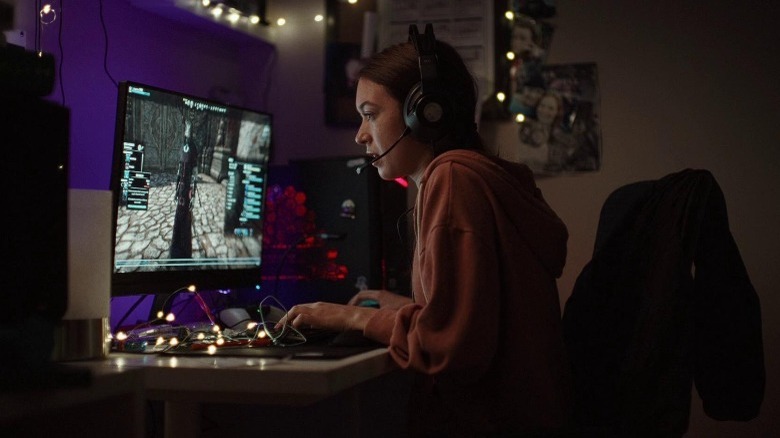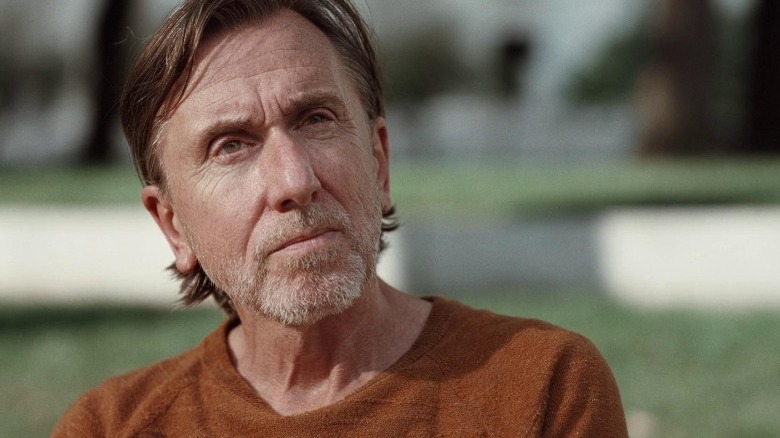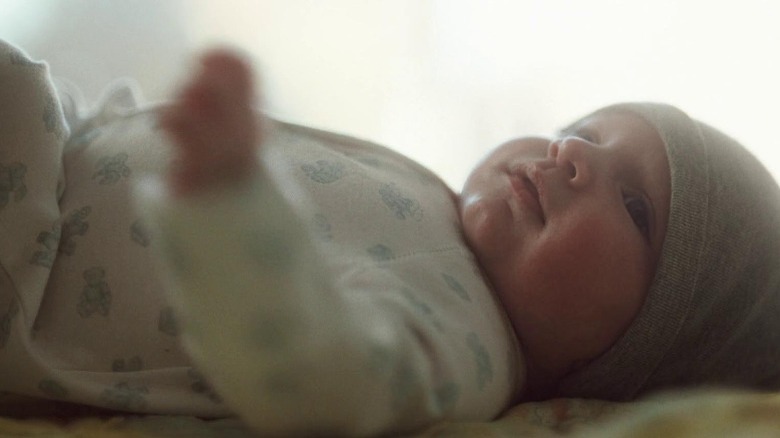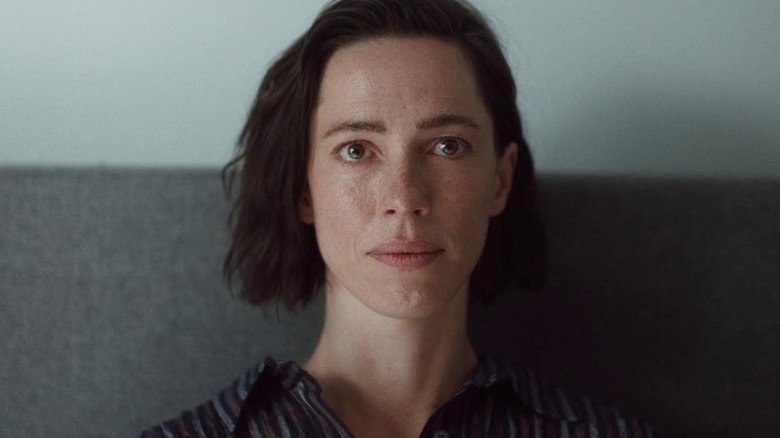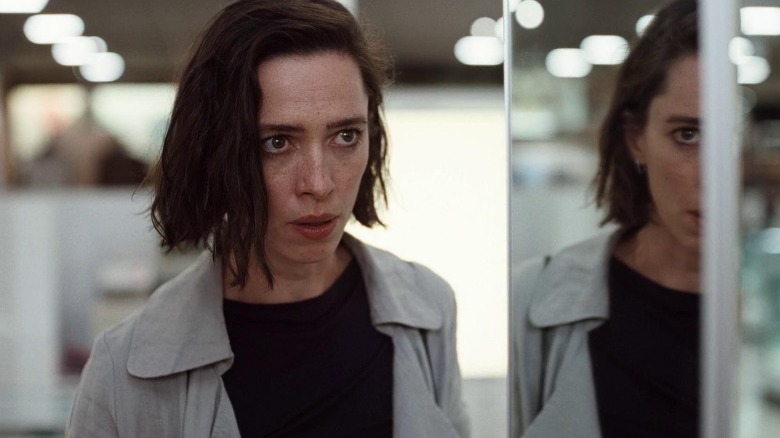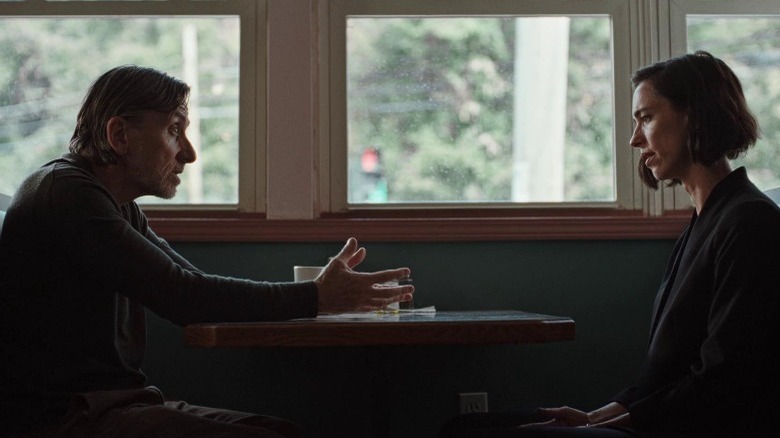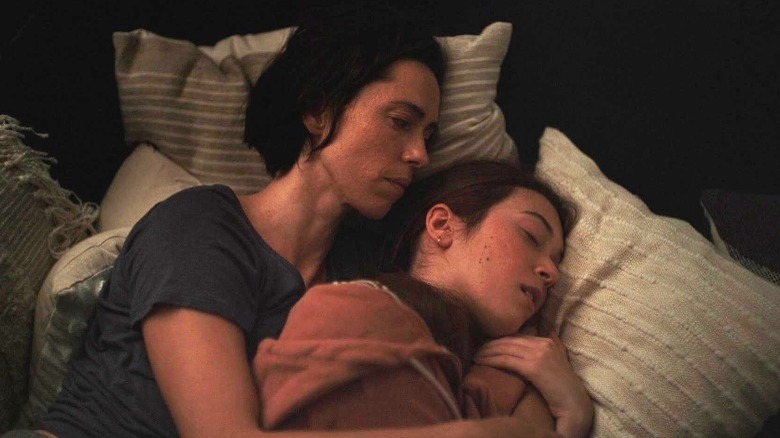The Ending Of Resurrection Explained
Some movies simply refuse to let you go. We reviewed "Resurrection" when it debuted in the summer of 2022, but since then the movie and its complex ending have haunted the minds of countless horror movie fans. The sickening relationship between Margaret (Rebecca Hall) and David (Tim Roth) is the kind of thing that will keep you up at night, but their final confrontation is what really sets "Resurrection" apart and puts it among the best horror movies in recent years.
Hall and Roth both brought their A-game to the movie, but the story's strength managed to shine through even on the page. In our exclusive interview with Roth, he said that he agreed to star in the film because his son read the script and told him that he absolutely had to do it. We're thankful he did because it's hard to imagine another actor making David as deeply unnerving as he is.
"Resurrection" puts its audience through the wringer, and it refuses to give them a peaceful catharsis at the end. The film's conclusion leaves you with more questions than you had when you started, but we're here to shed some light on the disturbing, baffling, enthralling ending of "Resurrection."
What you need to remember about the plot of Resurrection
Margaret seems to have a perfect life at the beginning of "Resurrection." She's found success with her company and seems to enjoy her job. She has a strong relationship with her daughter Abbie (Grace Kaufman), who has just turned 18. She also has a comfortable, if illicit, relationship with her married coworker Peter (Michael Esper). We get to see how Margaret balances her work life and personal life, and it seems like she's truly in control. Then David shows up.
Margaret first notices David at a conference she attends for work. After that she starts seeing him wherever she goes, though he doesn't approach her at first. From there Margaret's life quickly turns upside down. She grows increasingly paranoid and won't let Abbie leave the house, but she won't tell her daughter what's really going on.
Instead Margaret confesses to an intern at work that she was in a relationship with David 22 years ago, when she was barely 19. After she moved in with him, David quickly revealed himself to be sadistic and manipulative, making her harm and humiliate herself in what he called "kindnesses." Eventually Margaret gave birth to their son, Benjamin, but she came home one day to find Ben gone and David claiming to have ate him. He tried to convince Margaret that Ben lived inside his body now, but even though part of her started to believe him, Margaret escaped and started her life over.
What happened at the end of Resurrection
Back in the present day, David starts manipulating Margaret all over again. He threatens to hurt Abbie unless Margaret goes back to performing kindnesses, like walking to work barefoot every morning or staying up all night standing in a complicated yoga pose in a park. Abbie and Peter start to worry that Margaret is having a psychotic breakdown, but she still refuses to tell either of them the truth, cutting them off instead in an attempt to protect them from David.
Just as Margaret hits rock bottom, she comes up with a plan. She records a message for Abbie explaining the truth behind her paranoid behavior, then she heads to David's hotel room to confront him face to face. David goes right back to talking about Benjamin, who he claims is still a baby and still alive inside him. For a moment, Margaret thinks that she can hear the baby, and that gives her the motivation she needs to pull a knife on David.
After a messy fight, David is bleeding out on the floor, and Margaret decides she needs to do something drastic to save baby Benjamin. She cuts into David's stomach and pulls a live baby from inside him. From there, the movie flashes forward to Margaret's home. Abbie is holding her half-brother, and she tells Margaret that she's not afraid anymore. Margaret's entire expression shifts as she lets out a terrified gasp, and the movie ends.
Why is the tooth significant?
The shocking conclusion to "Resurrection" probably caught most viewers off guard, but at the very beginning of the story, the movie lays the groundwork for its eventual departure from total realism. There's a brief moment between Margaret and Abbie that feels ominous but a little out of place on first watch, but that comes into focus when the movie wraps up.
Early in the movie, Abbie tells Margaret that she's found a human tooth in her bag. Margaret's confused, and the sudden appearance of a tooth seems impossible, but Abbie still has it and shows it to her mom. With no clear explanation of how it got there, the two of them shrug off the bizarre event, and they never talk about the tooth again.
In retrospect, that small moment sets the stage for Benjamin's appearance at the end of the movie. The tooth establishes that strange, impossible things can happen in this world, but even more importantly, it sets a baseline for how other people will respond to those things. The movie never gets into the logic of how teeth might appear in strange places or babies might exist inside other people for decades, but it sets the tone early on and lets these horrifying, miraculous occurrences find their thematic place in the story.
What's the importance of Margaret's relationship to Peter?
Peter only gets a handful of scenes in "Resurrection," and falls by the wayside once David shows up, as Margaret's entire life becomes centered on protecting herself and Abbie. At one point Abbie contacts him so the two of them can stage an intervention for Margaret, but they don't get very far with her. The last time we see Peter, he admits to Margaret that he's in love with her, but she's not in a place where that matters much to her.
It might seem like Peter is a bit of a throwaway character, but his relationship with Margaret actually gives us a deeper insight into who she is and what's happened to her in the years since she left David. The fact that Margaret and Peter have a relationship at all tells us that some part of Margaret is still interested in love, even though she always intended to raise Abbie as a single mother.
At the same time, the fact that Peter is married tells us that Margaret prefers a relationship with heavy restrictions. After everything she experienced with David, Margaret doesn't want to be the sole focus of anyone's attention ever again. But she healed from her experience with David once before, so there's every chance that she'll be able to do it again. Maybe she and Peter will find a way to work things out.
Why doesn't Margaret tell Abbie what's going on?
David's reappearance in her life almost completely destroys Margaret's relationship with her daughter. At first Margaret's increasing paranoia just puts Abbie on edge, but it doesn't take long for things to escalate. Pretty quickly Margaret is staying out all night, constantly having panic attacks, and all but forcing Abbie to remain locked in her room.
This whole time, Abbie just thinks that her mother is having some kind of psychotic episode, and Margaret refuses to give her any kind of explanation for her behavior. There's definitely a horror movie trope in play here because the story's tension wouldn't rise nearly as much if Margaret confessed even a watered-down version of the truth.
On the other hand, Margaret's refusal to explain everything to Abbie is more than just a convenient plot device. She's gone decades without telling anyone in her life about what David did to her, and that prolonged silence is just another part of David's sadism. He convinced Margaret that she was a terrible mother, who allowed her son to die and then abandoned him. When he comes back Margaret is paralyzed because all of her worst fears are finally being realized, and she thinks that if she tells Abbie the truth, her whole world will come crashing down around her. In the end, though, breaking her silence in a video confession to Abbie is a big part of what gives Margaret the strength to really face David.
What were David's deeper motives?
Part of what makes David such a compelling antagonist is that he's basically a walking mystery box. The movie reveals plenty of factual information about David. We know that he's a biologist and that he's quite a bit older than Margaret. We know that he was a researcher working with Margaret's parents when she was a teenager, and he managed to charm his way into the family. We also know all about the kinds of things David made Margaret do, which gives us a pretty clear understanding of just how twisted he is.
What gets lost in the mix of David's cruelty are his true intentions. Obviously he's obsessed with Margaret and enjoys making her miserable, but some of what David does seems to go beyond that basic urge. After all, there were plenty of ways for David to make Margaret suffer without going as far as eating her baby.
Does David believe the lies that he tells Margaret? Does he really think that Benjamin is alive inside him? If we take the ending at face value, then he probably did realize that he had a baby in him, but that just opens the door to more questions. We don't know if David's research had anything to do with Benjamin, or if his "kindnesses" had some kind of deeper meaning. Luckily in this case, the gaps in our knowledge are more satisfying than solid answers ever could be.
Was the baby real?
This brings us to what is likely the biggest question that viewers walk away with at the end of the movie: What the hell just happened? Setting aside the bit of human tooth foreshadowing at the beginning of the movie, there is very little that prepares us for Margaret pulling a baby out of David's stomach after killing him. Had the movie ended there, it would be easy to say that Margaret must have hallucinated the baby after the trauma of finally killing her abuser. The actual last scene in the movie, however, complicates things.
We see Abbie holding baby Benjamin, while talking to Margaret as though things have gone back to normal. At this point Abbie knows the truth about David, and she comforts Margaret by telling her that she isn't afraid anymore. Unless you write off this entire scene as an extended hallucination — which may not be as easy as it sounds — then this look at Margaret's peaceful home life seems to indicate that Ben is real.
How is it possible for Benjamin to have lived, and never aged, inside David for decades? The movie isn't at all concerned with providing us an answer. Instead, "Resurrection" is entirely focused on what that means in this world and for these characters. Theme outweighs logic, and the movie as a whole is better for it.
How does Margaret's last gasp change the story?
The true finale of the movie is Margaret's terrified gasp just before the credits roll. Her expression shifts from serenity to terror in the seconds after Abbie tells her that she's not afraid anymore. That gasp has huge implications for the movie's meaning, but it all depends on how you want to interpret the moment.
It's possible to understand Margaret's gasp as being a sign of reality crashing into her hallucination. Maybe she only thinks that she pulled Benjamin out of David's body, and she's just imagining that she pulled her life together with Abbie and the baby. Suddenly, her fantasy shatters, and Margaret gasps as she's pulled back into the real world. That interpretation makes sense, but the movie doesn't necessarily support it. When Margaret gasps, nothing else about the scene changes. She doesn't find herself still in David's hotel room or in a prison cell. She's still in her bed at home, so maybe that's what's actually going on.
Assuming that the ending of the movie isn't a hallucination, Margaret's gasp takes on a much sadder meaning. Abbie tells her that she's not afraid anymore, but Margaret's expression shifts because she realizes that her own fear is still very much alive. Margaret comes to terms with the fact that most of her life has been driven by fear and killing David didn't actually set her free. From that point of view, her gasp is absolutely heartbreaking.
What has Rebecca Hall said about the film?
Rebecca Hall found a way to capture the complex emotional life of Margaret and translate all her internal conflict into a performance that you truly can't look away from. Part of what makes Hall's performance so spectacular is that she understands the different layers of Margaret's character and sees why she's not just a victim. In an interview with RogerEbert.com, Hall talked about the ways in which Margaret can't help but repeat the patterns of abuse she first experienced at David's hands. "As things get worse, she gets more controlling," Hall said, while pointing to Margaret's relationship with her intern and her insistence on protecting Abbie as areas where she mimics abusive behavior.
Hall has an equally nuanced view of the overarching story of "Resurrection." She sees it as being about more than just a single abusive relationship, and her view of the film's multiple takes on horror might just shed some light on the film's ending. In that same interview, Hall talked about how the movie also explores that fear that inherently comes with parenthood, saying, "When people have children, along with all the wonder, comes something which can only really be described as pure existential terror ... because you're suddenly confronted with a human being who it's your responsibility to keep safe." Maybe Margaret's gasp at the end of the movie really comes from her realization that now she once again has to dedicate herself to protecting her baby's life.
What does Andrew Semans have to say about the movie?
Writer-director Andrew Semans released his first feature-length film, "Nancy, Please," back in 2012, and a decade later "Resurrection" became his follow-up project. In an interview with Filmmaker magazine, Semans explained that he spent years toying with the script for "Resurrection," working on it whenever inspiration struck, until it eventually became the movie it is now.
Unfortunately, much of the inspiration for "Resurrection" came from Semans's own life. In the early stages of the writing, he based Margaret's character on his own mother. As for the film's other lead, Semans said, "I've had the misfortune of knowing a couple of true malignant narcissists in my life, real sociopathic men ... and they served, to one degree or another, as inspiration for David."
The idea for Margaret's twisted relationship with David also sprang from Semans's real life. In the beginning, Semans was most interested in exploring the relationship between parents and their children. He knew that Margaret's daughter was going to be threatened, and that Margaret would have to go as far as possible to save her. While working on the screenplay, one of Semans's friend got wrapped up in a toxic relationship, and by helping his friend untangle what he viewed as a trauma bond, Seman managed to crack the rest of his story. As fantastical as some of the elements in "Resurrection" are, all the moments of horror jump out so strongly because they're rooted in reality.
Will there be a sequel?
Don't count on there being a "Resurrection 2." There are a handful of real-life complications that make a sequel seem unlikely. Writer-director Andrew Semans has spent much of the last decade working as a producer, and we know it took him years to write "Resurrection," so it's unlikely he's got the time to think about making another one. Adding to that, Rebecca Hall has a very busy schedule, so getting her back for another film might be a distinct challenge.
Even if we set the real world aside, the movie itself doesn't leave much room for embellishment. David is the real source of dramatic tension in the film, and Margaret kills him by the end of it. A follow-up movie could definitely continue exploring Margaret's issues and fears as a mother, but it would probably struggle to be as narratively satisfying as "Resurrection." There is also the film's ending, which is absolutely strengthened by its ambiguity and would likely be ruined by any further details being added. "Resurrection" ends on a high note, and it should be left alone to ring that out.
